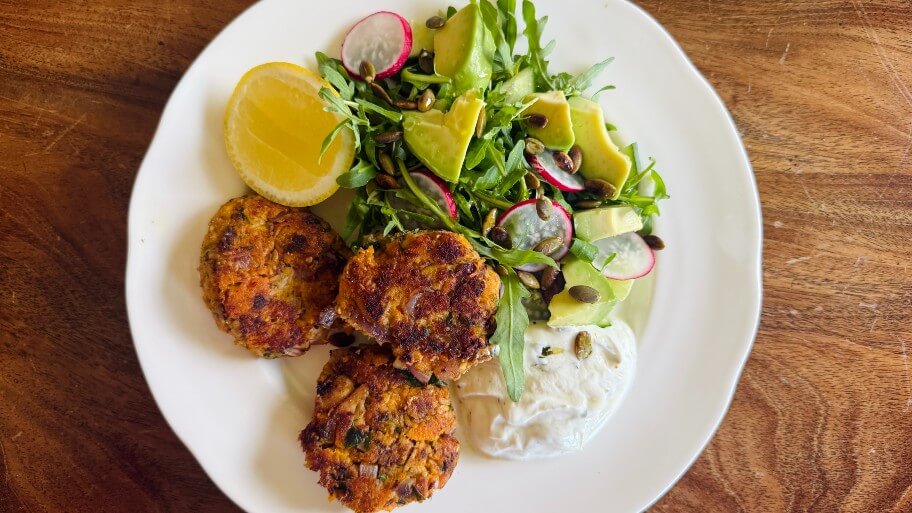.png?sfvrsn=b1cd0f20_1)
PHD qualified nutritional scientist and practising dietician, Dr Joanna McMillan is one of Australia’s favourite and most trusted health and wellbeing experts. Her goal is to translate emerging research and science into present and future lifestyle choices and diet advice for both people and planet.
“My goal is to translate the science and emerging research into what that really means for us all, now and in the future, in terms of what and how we eat, and the lifestyle choices we make, to help us to look and feel our best at every age, while giving us the best chance of optimal health. We also have to think about how these choices impact the health of our planet, shaping the way we eat in the future.”
Sustainable seafood with a purpose
Globally, 38% of fish stocks are overfished. Yet if all fisheries were managed sustainably, it’s estimated we could feed an additional 72 million people a year. The MSC blue tick helps consumers identify seafood that comes from well-managed, sustainable sources. It's a simple but powerful way to make a positive impact.
Some studies suggest that diets rich in seafood may help reduce the risk of cognitive decline and support emotional wellbeing, a win for both women and men navigating busy, high-stress lives. Seafood has been shown to contain a plethora of beneficial nutrients, such as:
Selenium: which has important antioxidant effects, reducing oxidative stress which is a driver of aging.
Omega-3 fatty acids: have anti-inflammatory effects which are key for brain health and may slow cognitive decline. They are also crucial for mood, memory and mental sharpness.
Protein: important in reducing sarcopenia (muscle loss)
The other array of nutrients like B12, niacin and vitamin D (higher in oilier fish), which are all important for brain, heart, immune and skin health.
Octopus is a nutritional powerhouse
Octopus is rich in nutritional value and health benefits. It contains more vitamin B12, selenium, copper, iron, magnesium, iodine and calcium than beef. The iron content is great for women's health–100g raw octopus contains 5.3g iron. In comparison, 100g raw trimmed rump steak has 2.1g iron. It’s also haem iron, meaning it’s better absorbed and utilised than non-haem iron found in plant foods. With its high quality, lean protein, octopus supports muscle repair and growth and is ideal for active men or those focused on maintaining muscle mass as they age. It’s rich in zinc, supporting immune function, wound healing and healthy testosterone production.
Octopus is resilient to climate change and the industry has adopted a range of ethical fishing practices. For example, the Western Australia octopus fishery uses smart, low-impact trigger trap technology that mostly catches male octopi, leaving more females, which increases the reproductive opportunity for the species. It also results in less than 1% bycatch (hyperlink bycatch), preserving other species. It was the first octopus fishery in the southern hemisphere to achieve MSC certification for sustainability. The MSC certified, Fremantle Octopus is available at Coles.
Dr Jo’s Spanish-style octopus with smoky chickpeas and sautéed greens is as good for your body as it is for your taste buds. Using pre-cooked MSC certified octopus, this dish is quick and easy to prepare, ideal for busy weeknights. It’s Mediterranean-inspired, protein-rich, and loaded with fiber and antioxidants from vegetables and legumes.
Serve it with crusty sourdough or over a bed of quinoa for a nourishing, vibrant meal that supports your health and our oceans.
Tuna as a health staple
Skipjack and albacore tuna (most commonly canned) are well below safe levels of mercury. Tuna is also an excellent source of selenium which binds it, reducing bioavailability in the body. Sustainably sourced canned tuna is safe for regular consumption and provides essential and beneficial nutrients.
Over half (54%) of wild caught tuna sold in Australia is now MSC certified sustainable. Only 2% of tuna is overfished and consumption of canned tuna is increasing, with 78% of Australians purchasing canned tuna (in 2025) compared to 72% in 2023. 79% of consumers check if the tuna they purchase is sustainable, with Millennials (85%) and Gen Z (82%) most likely to check.
Try out Dr Jo’s MSC Certified Sustainable, refreshing and high in protein Tuna Buddha Bowl with Lemon-Tahini Dressing.
Why sardines matter
Sardines are low in saturated fat and high in protein, as well as an excellent source of omega-3. Sardines are also rich in calcium and vitamin D for strong bones, which is especially helpful in menopausal women where bone density loss is a key issue.
The wild capture of sardines is among the lowest in carbon emissions compared to production of other meats and dairies. Wild capture seafood production is generally less environmentally harmful than the production of most land-based animal foods, requiring no land, fresh water, fertilisers or feed. Sardines play a crucial role in the marine ecosystem, so it’s essential to ensure you’re selecting brands that source from sustainable fisheries.
Try Dr Jo’s satiating, flavourful MSC certified Sardine & Sweet Potato Fishcakes with Herby Yogurt Sauce.
In collaboration with Dr Jo McMillan


.tmb-author.png?Culture=en-AU&sfvrsn=b1cd0f20_1)
